
Expedia (EXPE)
Expedia doesn’t impress us. Its growth has been lacking and its free cash flow margin has caved, suggesting it’s struggling to adapt.― StockStory Analyst Team
1. News
2. Summary
Why Expedia Is Not Exciting
Originally founded as a part of Microsoft, Expedia (NASDAQ:EXPE) is one of the world’s leading online travel agencies.
- Customer spending has dipped by 1.7% on average as it focused on growing its bookings
- Expensive marketing campaigns hurt its profitability and make us wonder what would happen if it let up on the gas
- One positive is that its platform is difficult to replicate at scale and results in a best-in-class gross margin of 89.6%


Expedia doesn’t fulfill our quality requirements. We see more lucrative opportunities elsewhere.
Why There Are Better Opportunities Than Expedia
Why There Are Better Opportunities Than Expedia
At $234.86 per share, Expedia trades at 8.4x forward EV/EBITDA. The current valuation may be fair, but we’re still passing on this stock due to better alternatives out there.
There are stocks out there featuring similar valuation multiples with better fundamentals. We prefer to invest in those.
3. Expedia (EXPE) Research Report: Q3 CY2025 Update
Online travel agency Expedia (NASDAQ:EXPE) reported Q3 CY2025 results beating Wall Street’s revenue expectations, with sales up 8.7% year on year to $4.41 billion. On top of that, next quarter’s revenue guidance ($3.41 billion at the midpoint) was surprisingly good and 4.2% above what analysts were expecting. Its non-GAAP profit of $7.57 per share was 9% above analysts’ consensus estimates.
Expedia (EXPE) Q3 CY2025 Highlights:
- Revenue: $4.41 billion vs analyst estimates of $4.29 billion (8.7% year-on-year growth, 2.9% beat)
- Adjusted EPS: $7.57 vs analyst estimates of $6.95 (9% beat)
- Adjusted EBITDA: $1.45 billion vs analyst estimates of $1.33 billion (32.8% margin, 8.8% beat)
- Revenue Guidance for Q4 CY2025 is $3.41 billion at the midpoint, above analyst estimates of $3.27 billion
- Operating Margin: 23.5%, up from 18.8% in the same quarter last year
- Free Cash Flow was -$686 million, down from $921 million in the previous quarter
- Room Nights Booked: 108.2 million, up 10.8 million year on year
- Market Capitalization: $26.45 billion
Company Overview
Originally founded as a part of Microsoft, Expedia (NASDAQ:EXPE) is one of the world’s leading online travel agencies.
Expedia owns a wide portfolio of online travel brands, and owns stakes in many others. Its core Expedia site is a full service online travel agency (OTA) featuring airfare, lodging, car rentals, cruises, and insurance. Hotels.com is focused exclusively on hotels globally, Vrbo (previously HomeAway) is Expedia’s alternative accommodations property. Other properties include Orbitz, CheapTickets, Travelocity and business travel unit Egencia. Expedia also owns a majority stake in trivago, a hotel metasearch company, that generates revenues through advertising.
For consumers, Expedia simplifies planning travel, by aggregating supply of hotels, flights, and experiences and using its scale and rewards programs to offer the best prices, while for suppliers, Expedia delivers one of the largest audiences of travel shoppers online.
Historically, Expedia has held its largest market share in North America, specifically in Hotels, while it has long sought to take market share from market leader Booking.com and Priceline in Europe. It acquired HomeAway in recent years and has begun building up an alternative accommodations business to compete with AirBnB.
4. Online Travel
Because of the enormous number of flights, hotels, and accommodations available, travel is a natural fit for marketplaces that aggregate suppliers, simplifying the shopping process for consumers. Online travel platforms today make up over 50% of the industry’s bookings, a percentage that has been rising for 20 years, and will likely continue in the years ahead.
Expedia (NASDAQ:EXPE) competes with a range of online travel companies such as Booking Holdings (NASDAQ:BKNG), Airbnb (NASDAQ:ABNB), TripAdvisor (NASDAQ:TRIP), Trivago (NASDAQ:TRIV) and Alphabet (NASDAQ:GOOG.L).
5. Revenue Growth
A company’s long-term performance is an indicator of its overall quality. Any business can experience short-term success, but top-performing ones enjoy sustained growth for years. Regrettably, Expedia’s sales grew at a mediocre 8.3% compounded annual growth rate over the last three years. This was below our standard for the consumer internet sector and is a tough starting point for our analysis.
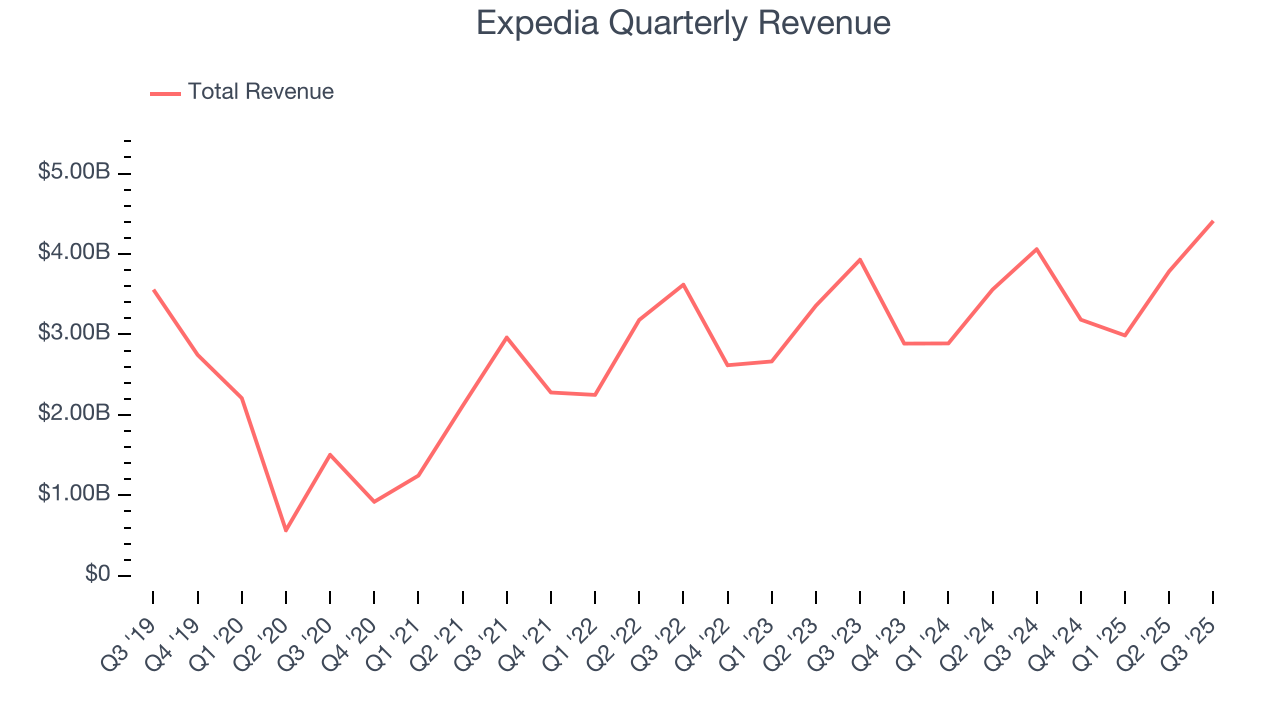
This quarter, Expedia reported year-on-year revenue growth of 8.7%, and its $4.41 billion of revenue exceeded Wall Street’s estimates by 2.9%. Company management is currently guiding for a 7% year-on-year increase in sales next quarter.
Looking further ahead, sell-side analysts expect revenue to grow 4.5% over the next 12 months, a deceleration versus the last three years. This projection is underwhelming and indicates its products and services will face some demand challenges.
6. Room Nights Booked
Booking Growth
As an online travel company, Expedia generates revenue growth by increasing both the number of stays (or experiences) booked and the commission charged on those bookings.
Over the last two years, Expedia’s room nights booked, a key performance metric for the company, increased by 8.9% annually to 108.2 million in the latest quarter. This growth rate is decent for a consumer internet business and indicates people enjoy using its offerings. 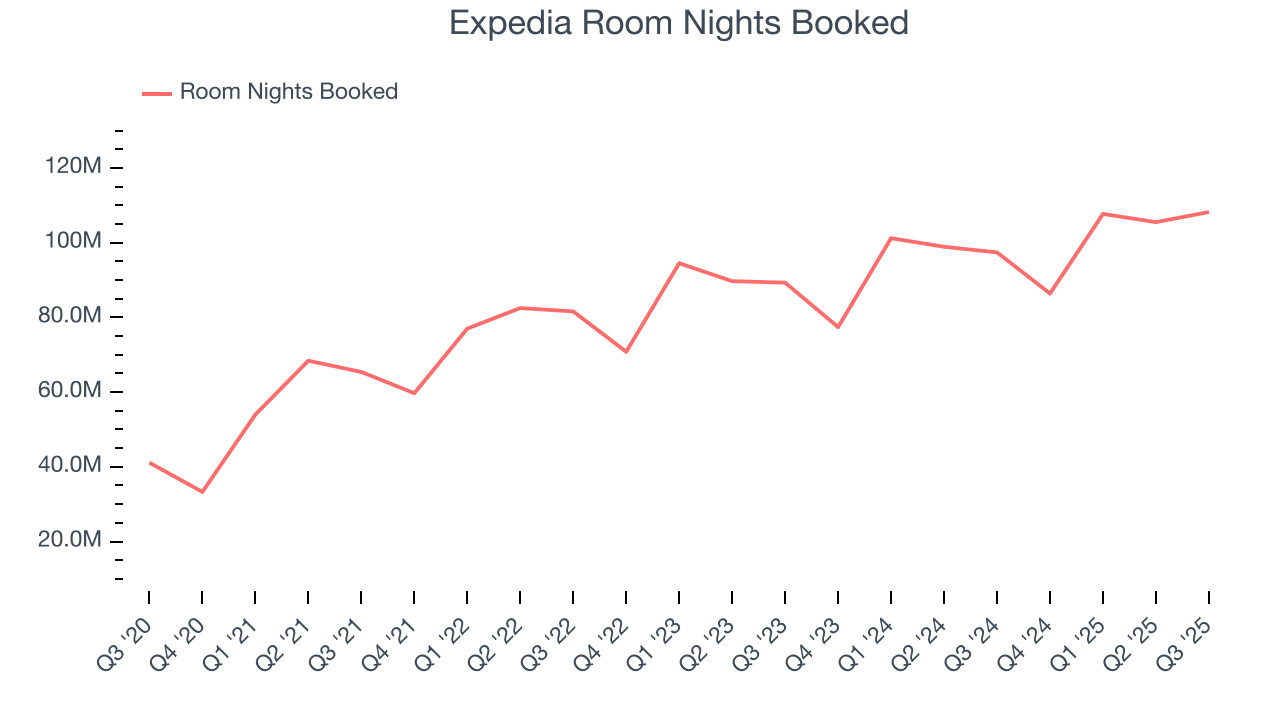
In Q3, Expedia added 10.8 million room nights booked, leading to 11.1% year-on-year growth. The quarterly print was higher than its two-year result, suggesting its new initiatives are accelerating booking growth.
Revenue Per Booking
Average revenue per booking (ARPB) is a critical metric to track because it not only measures how much users book on its platform but also the commission that Expedia can charge.
Expedia’s ARPB fell over the last two years, averaging 1.7% annual declines. This isn’t great, but the increase in room nights booked is more relevant for assessing long-term business potential. We’ll monitor the situation closely; if Expedia tries boosting ARPB by taking a more aggressive approach to monetization, it’s unclear whether bookings can continue growing at the current pace. 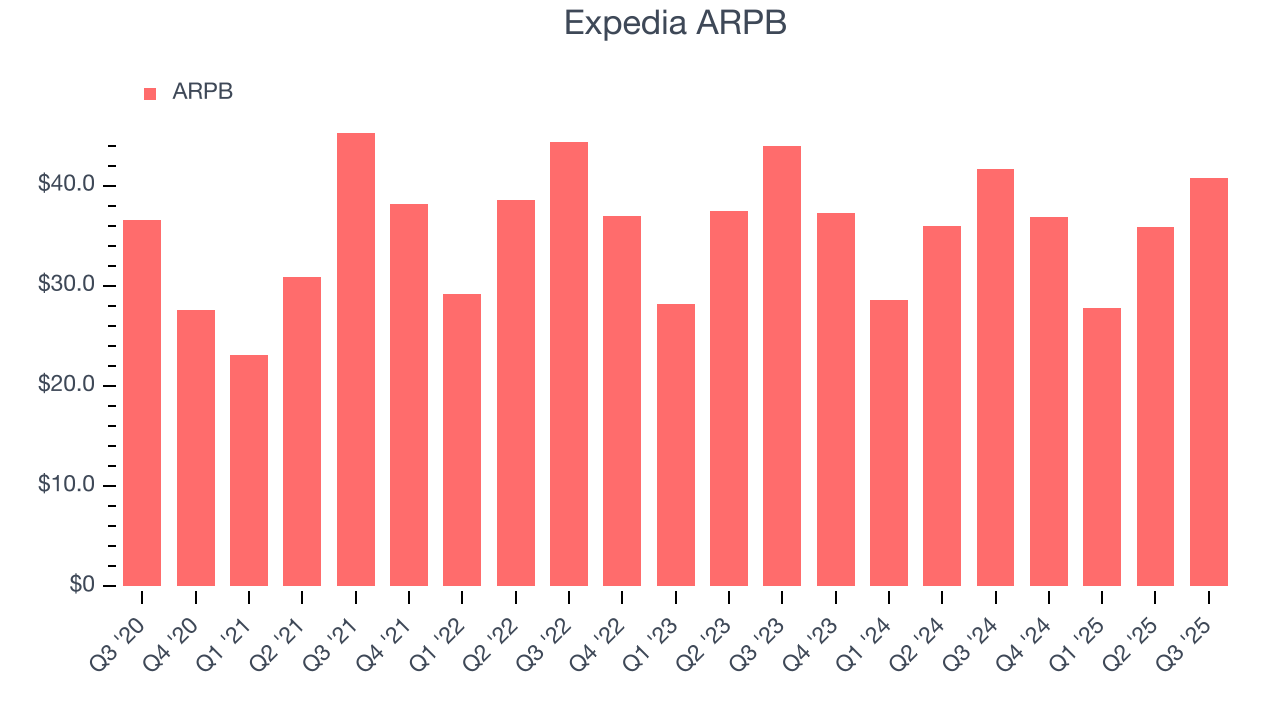
This quarter, Expedia’s ARPB clocked in at $40.78. It declined 2.2% year on year, worse than the change in its room nights booked.
7. Gross Margin & Pricing Power
For online travel businesses like Expedia, gross profit tells us how much money the company gets to keep after covering the base cost of its products and services, which typically include customer support, payment processing, fulfillment fees (paid to the airlines, hotels, or car rental companies), and data center expenses to keep the app or website online.
Expedia’s gross margin is one of the highest in the consumer internet sector, an output of its asset-lite business model and strong pricing power. It also enables the company to fund large investments in product and marketing during periods of rapid growth to achieve higher profits in the future. As you can see below, it averaged an elite 89.6% gross margin over the last two years. That means Expedia only paid its providers $10.42 for every $100 in revenue. 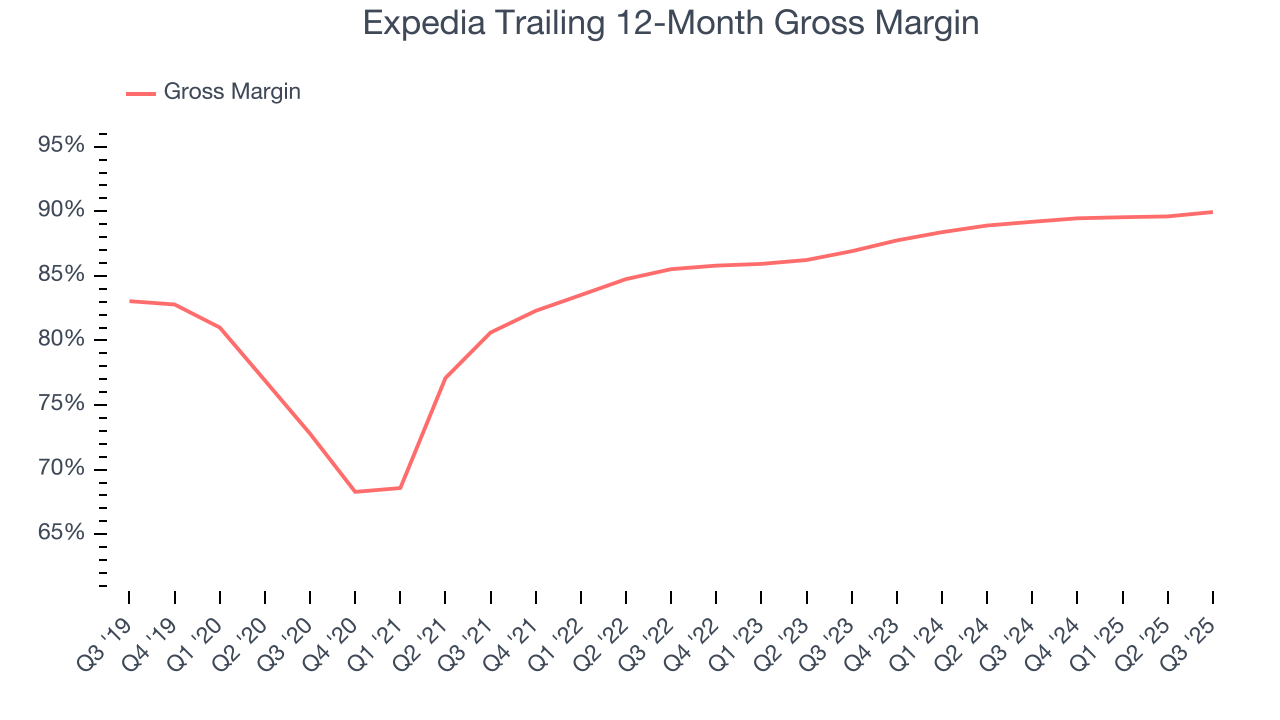
Expedia produced a 91.5% gross profit margin in Q3, marking a 1 percentage point increase from 90.4% in the same quarter last year. On a wider time horizon, the company’s full-year margin has remained steady over the past four quarters, suggesting its input costs have been stable and it isn’t under pressure to lower prices.
8. User Acquisition Efficiency
Consumer internet businesses like Expedia grow from a combination of product virality, paid advertisement, and incentives (unlike enterprise software products, which are often sold by dedicated sales teams).
It’s very expensive for Expedia to acquire new users as the company has spent 61.8% of its gross profit on sales and marketing expenses over the last year. This inefficiency indicates a highly competitive environment with little differentiation between Expedia and its peers.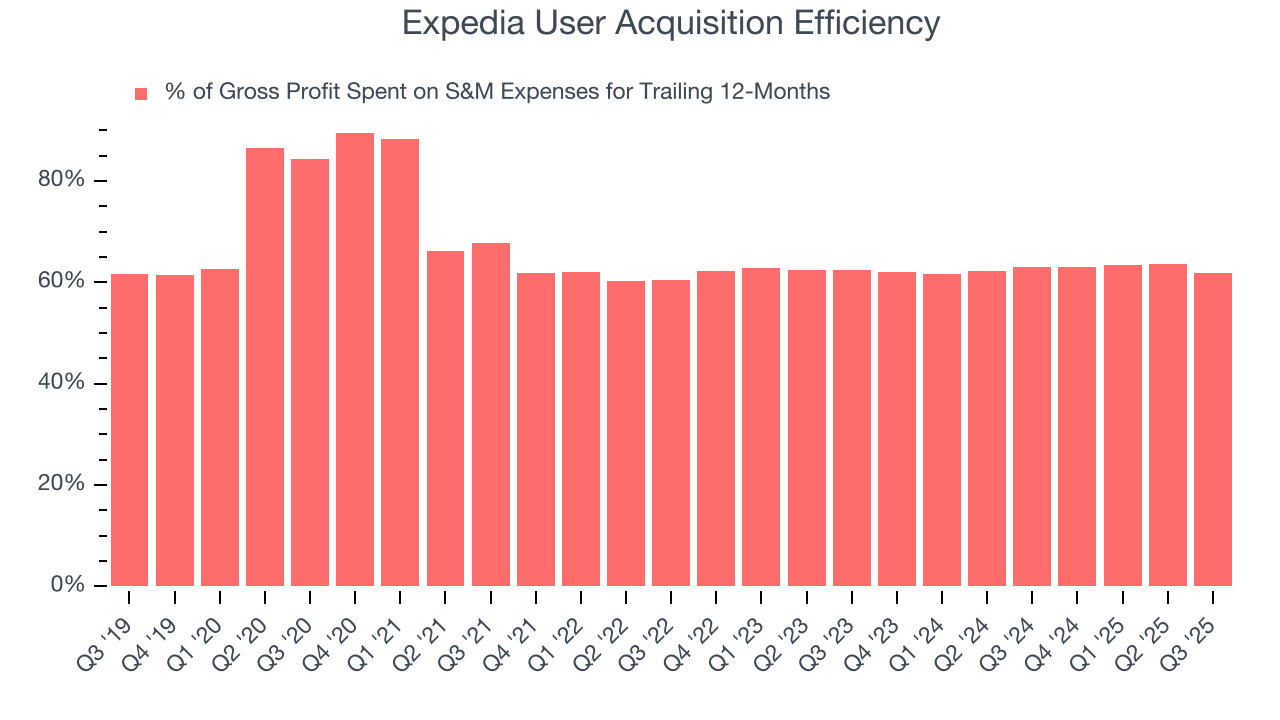
9. EBITDA
EBITDA is a good way of judging operating profitability for consumer internet companies because it excludes various one-time or non-cash expenses (depreciation), providing a more standardized view of the business’s profit potential.
Expedia has been a well-oiled machine over the last two years. It demonstrated elite profitability for a consumer internet business, boasting an average EBITDA margin of 22%. This result isn’t surprising as its high gross margin gives it a favorable starting point.
Looking at the trend in its profitability, Expedia’s EBITDA margin rose by 1.9 percentage points over the last few years, as its sales growth gave it operating leverage.
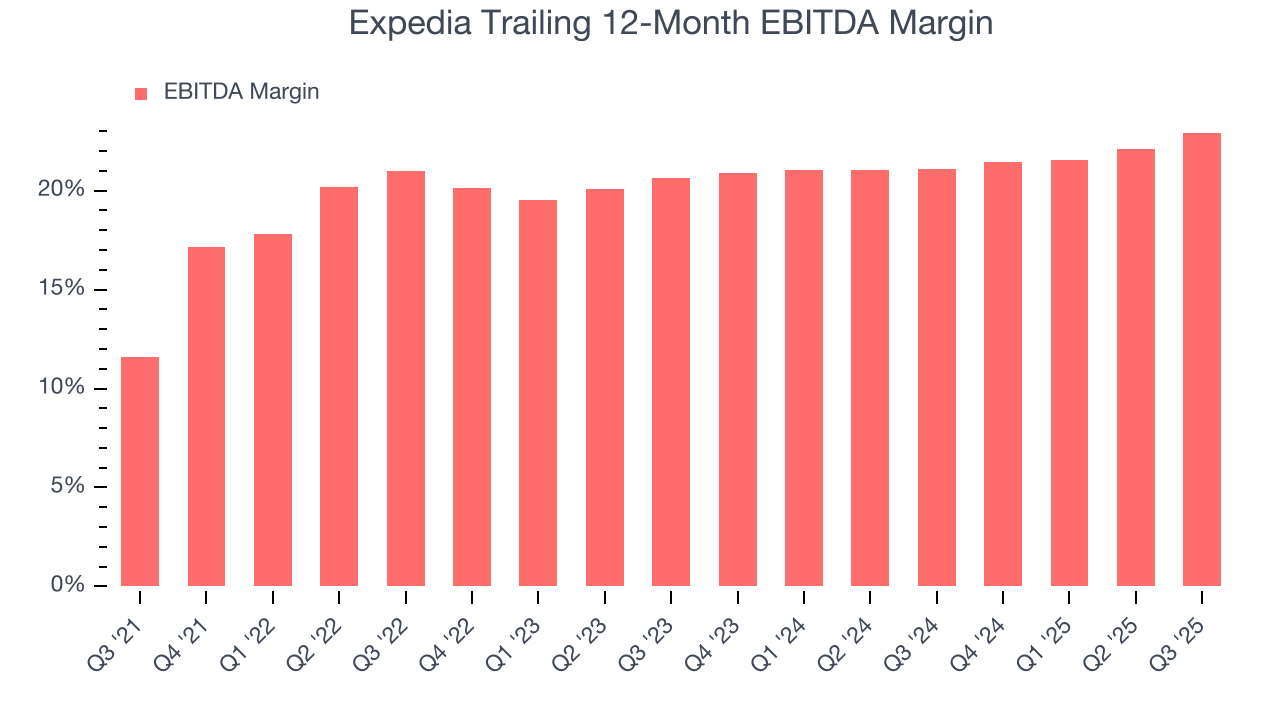
This quarter, Expedia generated an EBITDA margin profit margin of 32.8%, up 2.1 percentage points year on year. The increase was encouraging, and because its EBITDA margin rose more than its gross margin, we can infer it was more efficient with expenses such as marketing, R&D, and administrative overhead.
10. Earnings Per Share
Revenue trends explain a company’s historical growth, but the change in earnings per share (EPS) points to the profitability of that growth – for example, a company could inflate its sales through excessive spending on advertising and promotions.
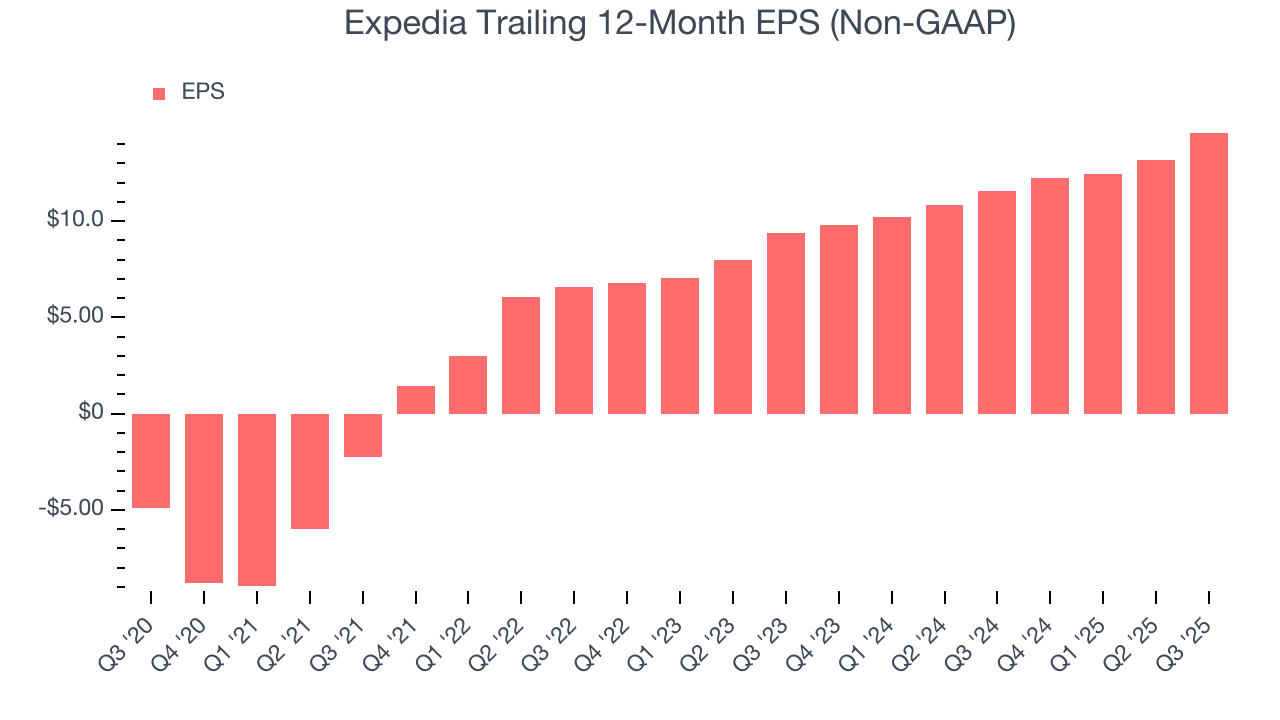
Diving into Expedia’s quality of earnings can give us a better understanding of its performance. As we mentioned earlier, Expedia’s EBITDA margin expanded by 1.9 percentage points over the last three years. On top of that, its share count shrank by 19%. These are positive signs for shareholders because improving profitability and share buybacks turbocharge EPS growth relative to revenue growth. 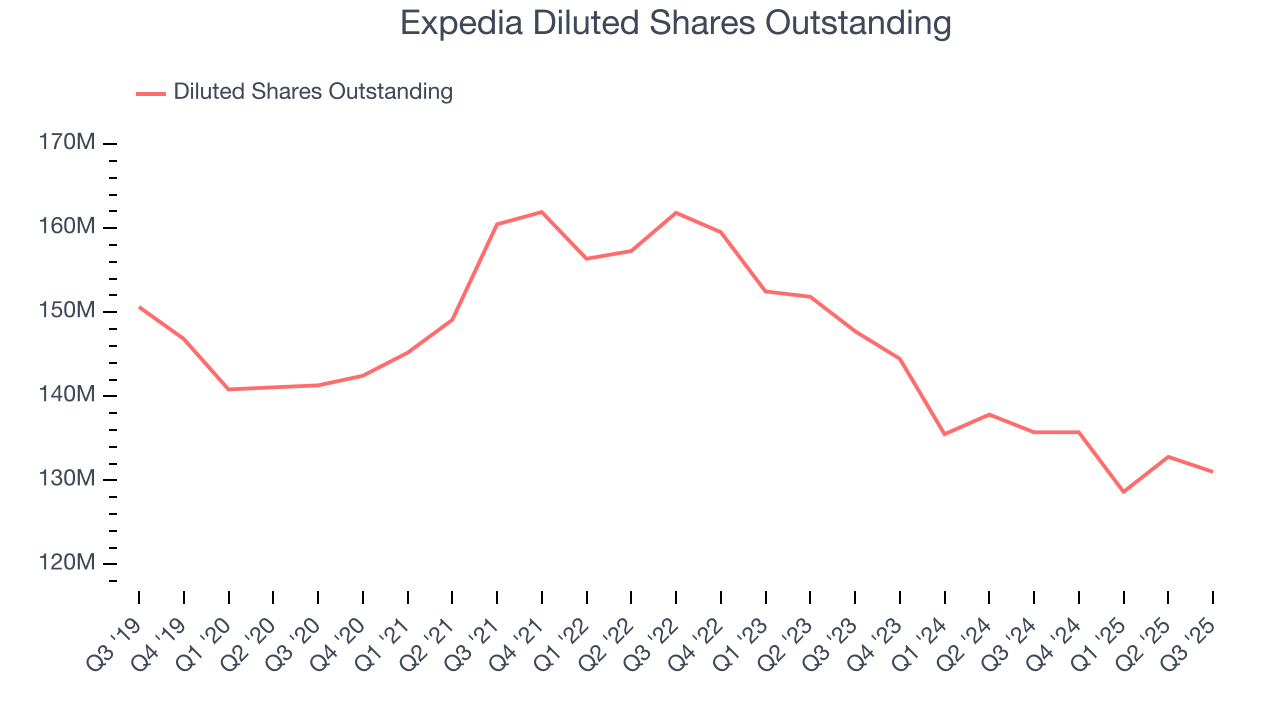
In Q3, Expedia reported adjusted EPS of $7.57, up from $6.13 in the same quarter last year. This print beat analysts’ estimates by 9%. Over the next 12 months, Wall Street expects Expedia’s full-year EPS of $14.60 to grow 8.4%.
11. Cash Is King
If you’ve followed StockStory for a while, you know we emphasize free cash flow. Why, you ask? We believe that in the end, cash is king, and you can’t use accounting profits to pay the bills.
Expedia has shown robust cash profitability, driven by its attractive business model that enables it to reinvest or return capital to investors while maintaining a cash cushion. The company’s free cash flow margin averaged 17.7% over the last two years, quite impressive for a consumer internet business.
Taking a step back, we can see that Expedia’s margin dropped by 8.1 percentage points over the last few years. It may have ticked higher more recently, but shareholders are likely hoping for its margin to at least revert to its historical level. If the longer-term trend returns, it could signal increasing investment needs and capital intensity.
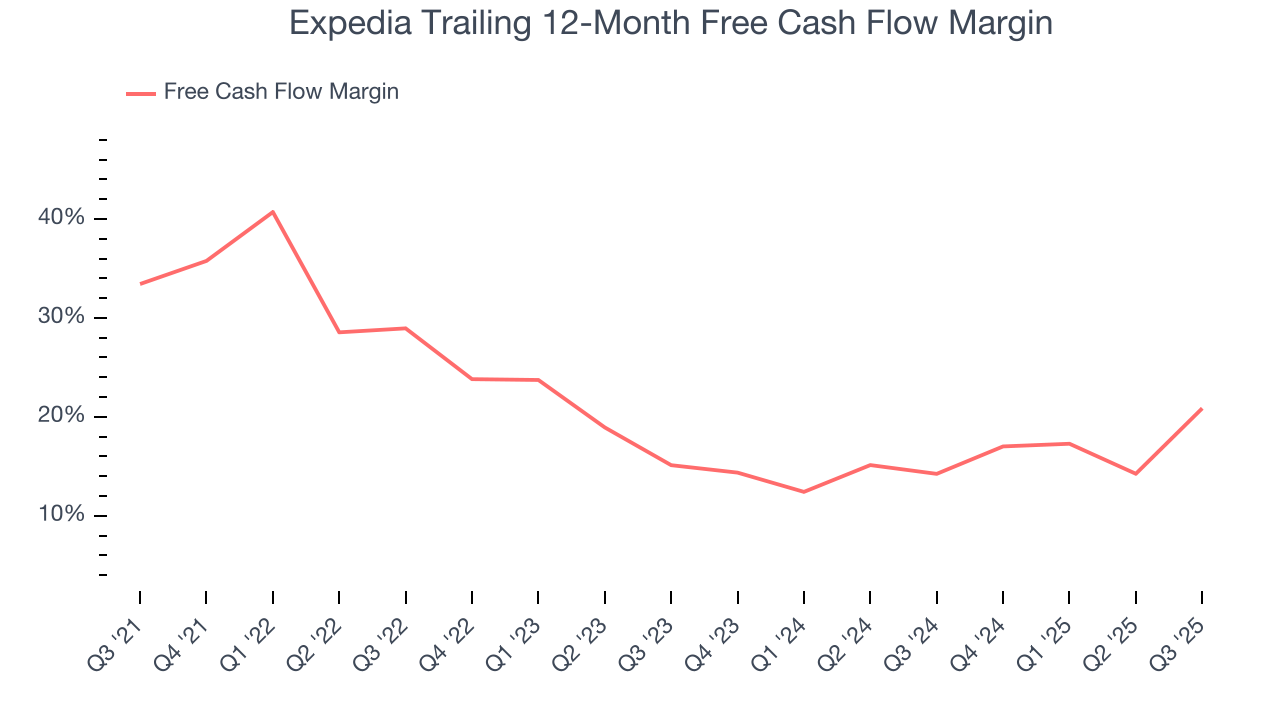
Expedia burned through $686 million of cash in Q3, equivalent to a negative 15.5% margin. The company’s cash burn slowed from $1.69 billion of lost cash in the same quarter last year. These numbers deviate from its longer-term margin, indicating it is a seasonal business.
12. Balance Sheet Assessment
Companies with more cash than debt have lower bankruptcy risk.
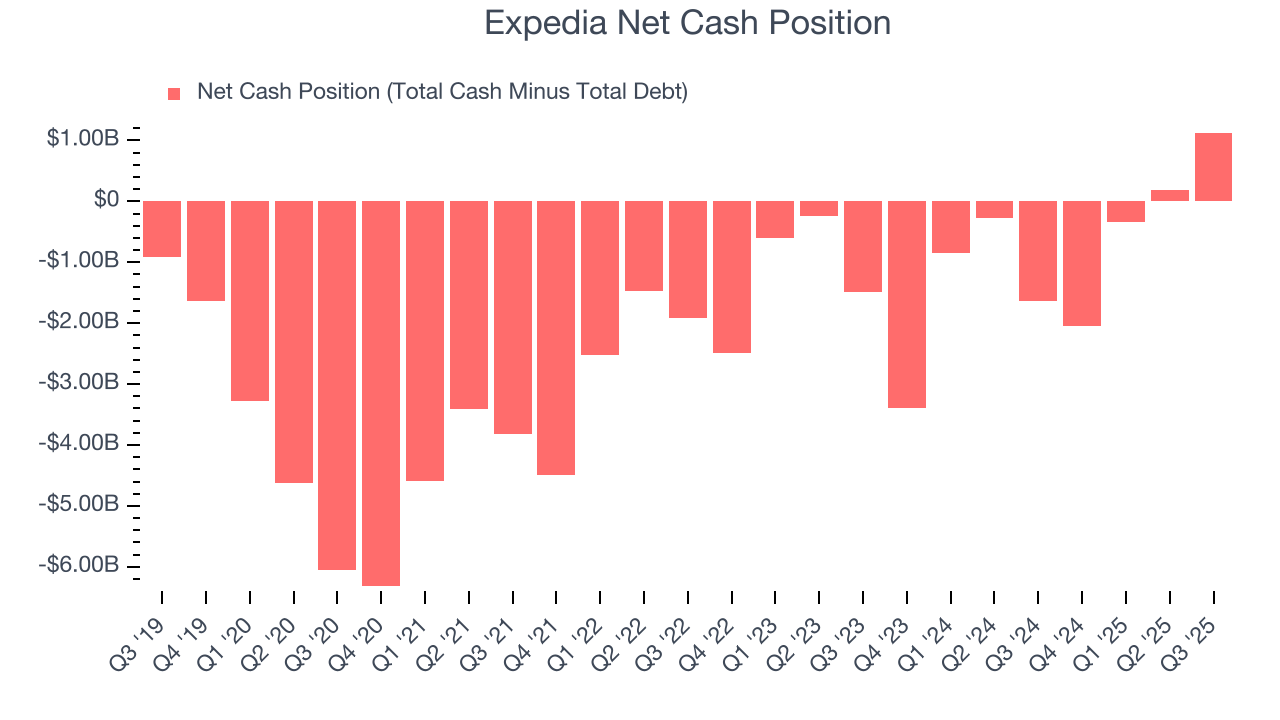
Expedia is a profitable, well-capitalized company with $7.61 billion of cash and $6.48 billion of debt on its balance sheet. This $1.13 billion net cash position is 4.3% of its market cap and gives it the freedom to borrow money, return capital to shareholders, or invest in growth initiatives. Leverage is not an issue here.
13. Key Takeaways from Expedia’s Q3 Results
We were impressed by how significantly Expedia blew past analysts’ EBITDA expectations this quarter. We were also glad its revenue guidance for next quarter exceeded Wall Street’s estimates. Zooming out, we think this quarter featured some important positives. The stock remained flat at $219.70 immediately following the results.
14. Is Now The Time To Buy Expedia?
Updated: February 4, 2026 at 9:22 PM EST
Before deciding whether to buy Expedia or pass, we urge investors to consider business quality, valuation, and the latest quarterly results.
When it comes to Expedia’s business quality, there are some positives, but it ultimately falls short. Although its revenue growth was mediocre over the last three years, its admirable gross margins are a wonderful starting point for the overall profitability of the business. Investors should still be cautious, however, as Expedia’s ARPU has declined over the last two years.
Expedia’s EV/EBITDA ratio based on the next 12 months is 8.4x. This valuation is reasonable, but the company’s shakier fundamentals present too much downside risk. We're fairly confident there are better stocks to buy right now.
Wall Street analysts have a consensus one-year price target of $290.35 on the company (compared to the current share price of $234.86).







